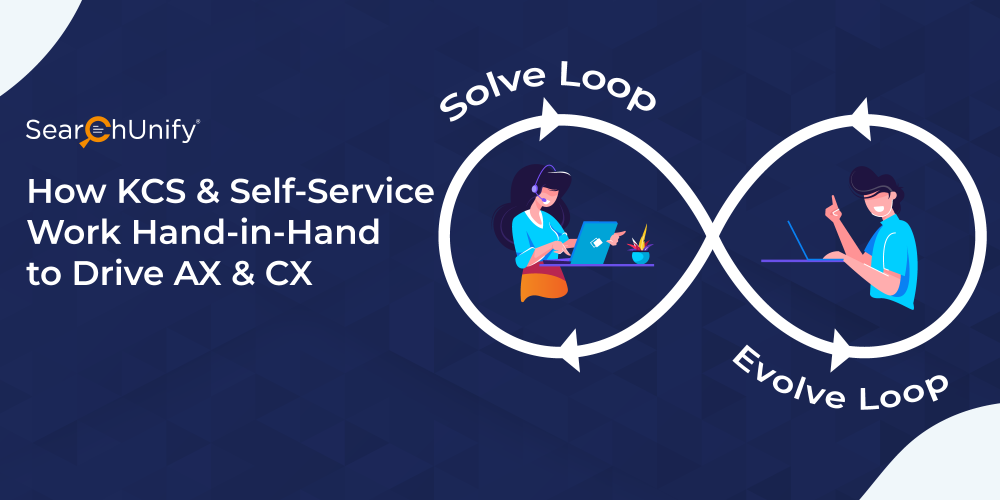
Businesses understand the crucial role that self-service plays in their CX strategy. As a result, they’ve started capitalizing on knowledge-centered service (KCS) as their biggest superpower to revolutionize self-service. KCS breaks through the limitations of traditional support strategies and enables organizations to deliver value and brand promise coupled with efficiency. The magic element? Knowledge.
Evolving the available information into organizational knowledge that is useful, reusable, and adds value for both customers and agents alike is the essence of KCS. The primary step here is capturing the collective experience of a firm and disseminating it to solve customer problems. To accomplish these goals, KCS creates a double loop process where the user requests are ‘solved’ at the source. The requests and resolutions are used to capture knowledge perpetually. This captured knowledge is ‘evolved’ and improved each time it is referenced in support operations.
This blog post cracks the code to establishing effective self-service models that are in line with KCS principles and how it benefits the participants.
Key Criteria While Designing Your Self-Service Models
Welcome to the age of DIY. Irrespective of the business field, odds are your customers are well-equipped and savvy to find answers to questions themselves rather than waiting for a support representative in a long queue. No matter how amazing your KB is, sometimes it just doesn’t make the cut. But fret not, given below are 4 ways to catapult your self-service models in alignment with the KCS practices.
1. Findability
Despite drowning in data, end-users still starve for the right information at the right time. KCS creates knowledge in the context of demand or use. Once the context is captured, the words and phrases used by requesters can help to improve the findability of an existing article. This makes the content usable by those who need it, at the moment of crisis.
2. Access
Right at the center of KCS strategy comes ‘effective search’ that empowers customers and employees to access information from multiple repositories. This way, they gain access to the firm’s collective experience, which further saves employees from reinventing the wheel and customers from redundant and outdated knowledge.
3. Navigation
Does the navigation for your self-service portal align with your customer intent? Do users have options to find relevant information – index, search, FAQs, etc.? Last but not the least, can users easily switch to assisted support if self-service wasn’t helpful? All this must be kept in mind while designing a self-service model.
4. Marketing
The era of ‘build it and they will come’ is passé. It’s now time to create a marketing plan that impels the user to use self-service. Best practices include creating a buzz around this newly drafted self-service solution coupled with overt actions which make the requesters use your self-service portal. And, if your customers like what they see, they would like to see it again.
4 KCS Principles that Directly Impact Self-Service Success
For most organizations, KCS represents a new way to think about knowledge and the benefits are profound. Given below are 4 ways, you can delve deeper into how KCS is directly proportional to self-service success:
1. Creating Content as a Byproduct of Solving Issues
Creating KBs should be a simultaneous process where the knowledge is captured during the interaction, not retrospectively. It is also important to capture the context along with the content. The KCS methodology involves reusing the information that already exists within the organization’s support ecosystem along with documenting the resolutions for new cases as they arise. With each reuse, the resolution is improved for better readability and searchability.
“Knowledge is like a garden: if it is not cultivated, it cannot be harvested.”
2. Embracing the ‘Reuse is Review’ Approach
By adopting the ‘reuse is review’ practice under the KCS methodology, the referenced articles are constantly improved and updated with each use. KCS adopts a demand-driven system that involves responding to issues as and when they occur. What’s more, no time is wasted in reviewing the articles that are never referenced. This technique helps to make KCS scalable and efficient by optimally utilizing resources.
3. Proliferating Knowledge Using Collected Experience
Knowledge operates on the principle of abundance. The more you share, the more you can learn. KCS seeks to capture the collective experience of the organization that individuals can use and act upon.
Since there are multiple contributors responsible for maintaining a KB, knowledge-centered service instills a culture of shared responsibility and collaboration. Capitalizing on this collective knowledge, KCS quickly identifies the issues related to products and services and provides actionable insights to the respective department to ensure proactive measures.
“The best people to capture and maintain support knowledge are the people who create and use it every day” – The KCS Academy
4. Rewarding Team Collaboration
For KCS to succeed, organizations must shift the value proposition from rewarding ‘dragon slayers’ to valuing individuals who are willing to learn, collaborate, share, and improve. KCS demands a culture of collective ownership where knowledge gets distributed as opposed to being concentrated in one space. So, instead of rewarding individual contributions, KCS recognizes a team for their shared knowledge and collaboration.
Tasting Self-Service Success Through Knowledge
KCS mandates that the creation and upkeep of knowledge must be a continuous process. The knowledge produced during support interactions can do wonders to create a fast-track self-service system along with elevating the CX and AX.
1. KCS Metamorphosis Support Agents into Knowledge Workers
KCS encourages collaboration and learning which not only improves inter-team communication but also makes knowledge relevant. Additionally, agents can edit and attach resolutions to cases. As a result, high-impact knowledge surfaces each time that enables quick resolutions and lower turnaround time.
2. Transform CX with KCS
Like we mentioned earlier, the best way to future proof your brand is by delivering your promise to offer a relevant CX. KCS captures the digital interactions and experiences of customers so that other users can reuse, learn, and benefit from them via self-service mechanisms. When everything is readily available for users, the overhead time taken and efforts made to find relevant information greatly reduces.
The Bottomline
KCS is not a trivial undertaking – it involves perseverance. Its adoption inevitably changes the nature of communicating and instills a sense of oneness within the support team. Combine KCS practices with intelligent search and ML capabilities, and your organization would have an unbeatable support mix. If you’re looking for a tool that leverages your collective knowledge and achieves desired business goals, then look no further than SearchUnify’s Knowbler. To see it live in action, request a demo.


















